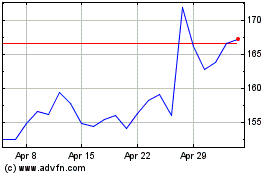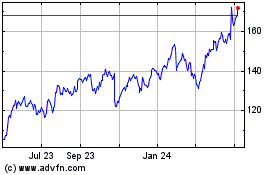Tech Companies Still Trusted More on Autonomous-Car Development
July 29 2016 - 8:57AM
Dow Jones News
By Jonathan Bach
A fatality linked to Tesla Motor Inc.'s Autopilot system has
done little to dent confidence in Silicon Valley's ability to do a
better job than traditional auto makers when it comes to
development of software for autonomous cars, according to a new
AlixPartners LLP survey.
The consulting firm surveyed slightly more than 1,500
respondents shortly before the late-June disclosure of the Tesla
fatality and then followed up with a revised study after the
incident attracted significant attention. In both cases, 41% of
respondents said they trusted Silicon Valley most to develop
self-driving software, far exceeding those who consider Japanese,
U.S. or European auto makers the best fit.
The company's initial survey was done without respondents'
knowledge of the fatality, which occurred in May.
The results underscore the concern among conventional auto
makers that they are perceived to be behind Tesla, Alphabet Inc.'s
Google and other tech firms in the race to deploy autonomous
vehicles. Most major auto makers have devoted significant research
and budgets to self-driving car development, but Google's car
project team and Tesla Chief Executive Elon Musk have gotten credit
for being faster movers in certain areas.
Google, for instance, has been credited for amassing more than a
million test miles with autonomous prototypes on public roads,
creating a sizable lead over competitors. While Tesla has been
criticized for not doing enough to educate drivers on how to
properly use its Autopilot, the company has been the most
aggressive when it comes to equipping its cars with advanced safety
systems.
Overall interest in autonomous cars didn't take much of a hit
after the Tesla fatality was disclosed, slipping only 3 percentage
points. There was "not a massive falloff" in popular opinion around
self-driving cars after the crash was disclosed, AlixPartners
Managing Director Mark Wakefield said.
Joshua Brown, a 40-year-old Ohio owner of a Tesla Model S, died
when his electric car drove under the trailer of an 18-wheel truck
on a highway in Williston, Fla., on May 7, according to regulators
and a Florida Highway Patrol report. The cause of the crash is
still being investigated.
The second survey showed the crash may have raised Tesla's name
recognition in the self-driving sphere and raised awareness of
autonomous cars generally. Before the crash, Google was the
dominant company people knew of when it came to self-driving cars,
at 42%, while Tesla came in second at 23%. In the second survey,
55% of participants cited Tesla, while Google's name fell to
20%.
Trust in autonomous cars rose when people were given the option
to take control of the car in an instant versus having a fully
autonomous vehicle, Mr. Wakefield said.
AlixPartners first conducted the study in June partially because
the skeptical media attention around self-driving cars didn't
necessarily reflect what the firm saw happening in the industry,
Mr. Wakefield said.
A similar survey recently released by the Boston Consulting
Group of consumers in the U.S., China and Germany supported
AlixPartner's results. People in those markets didn't lose marked
interest in riding in self-driving vehicles, be they completely or
semiautonomous, even in light of recent scrutiny around the
technology's safety.
Autonomous cars found the most favor in China, where Boston
Consulting saw an uptick in interest, from 75% in a study conducted
last August to 81% this month. In the U.S., a slight drop from 53%
to 48% of participants showed interest in self-driving cars. German
consumers remained most wary when compared to the other two
markets.
(END) Dow Jones Newswires
July 29, 2016 08:42 ET (12:42 GMT)
Copyright (c) 2016 Dow Jones & Company, Inc.
Alphabet (NASDAQ:GOOGL)
Historical Stock Chart
From Mar 2024 to Apr 2024

Alphabet (NASDAQ:GOOGL)
Historical Stock Chart
From Apr 2023 to Apr 2024
